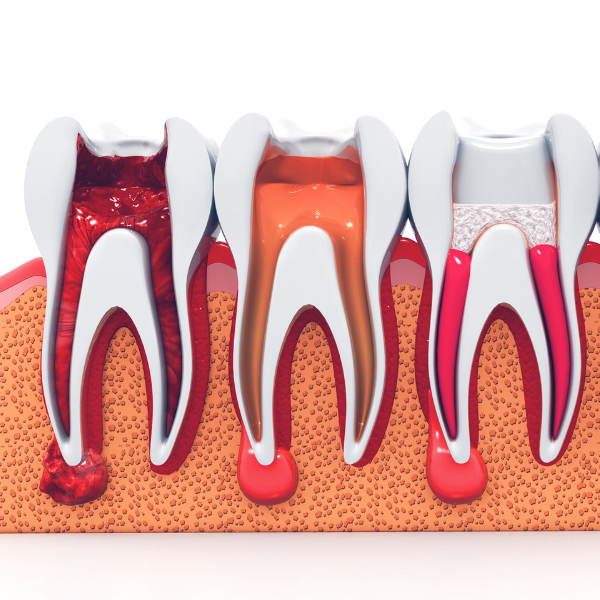Root Canal Therapy Near You
The central space inside your tooth is known as the pulp chamber. This is where a mass, aptly known as the pulp, is located. Nerves, connective tissues, and blood vessels meet here to deliver nutrients and blood to your tooth to keep it alive and healthy. If this fleshy sac becomes inflamed or damaged, it causes severe pain and sensitivity.
Visiting a dentist in Dacula for treatment soon is essential.
How Do You Know If You
Need a Root Canal?
That’s a good question, seeing as the symptoms of a damaged pulp can appear similar to other forms of oral trauma. Keep an eye out for any of the following warning signs:
- Your tooth’s started to darken
- Severe tooth pain
- It hurts to eat
- Pimples have formed on your gums
- Swollen gums
Every situation differs, so to make certain that this is the case, schedule an exam with your local dentist. They can accurately determine the correct treatment by physically inspecting your smile and taking multiple x-rays. Though a root canal may sound scary, it is often the best procedure to receive, especially if you want to save your tooth from extraction.

The Procedure
Explained
A root canal involves extracting the injured pulp and cleaning out the chamber. Doing so prevents infection and the need for future treatment.
Upon having your tooth evaluated, your dentist will start the treatment. First, local anesthesia is provided to help you stay relaxed and free of pain while your dentist works. Second, a drill is employed to access the pulp chamber, usually through the top of your tooth. When the mass is fully removed and the chamber is thoroughly cleaned of all debris, the space is shaped and filled with gutta-percha. The last step for this appointment is the placement of a temporary crown.
A permanent crown that satisfies your unique oral dimensions is added to the newly treated tooth once it’s made and delivered from a dental lab. This prosthetic will be designed from porcelain since it blends in with your other teeth and is durable again wear and tear and stains.
If you have questions or concerns at any point during the procedure, let your dentist in Dacula know so they can address them.
Looking for Quality
Root Canal Therapy in Dacula?
Here at Lanier Valley Dentistry, we are happy to offer a number of treatments that will effectively repair your smile – from dental fillings to crowns to root canals, we’ve got it all. Our team is eager to be with you on your dental journey and will do everything possible to ensure you have a positive experience.
To arrange an introductory appointment with a staff member, call or email today.
It is important to keep your gums and teeth healthy, through regular brushing and flossing. If you do suspect a dental infection, be sure to schedule an appointment with us. We do not want dental infections to spread, as they may lead to more serious illnesses and issues, such as tooth extraction, in the long run.
If you have any questions, please contact us at (678) 802-1209. You will meet with our root canal dentist who will explain in detail what the procedure comprises and what you must do to maintain your oral health. Our main goal is to help you maintain your oral hygiene. We will teach you how to prevent dental cavities and how to care for your teeth after root canal treatment.
Who is a Candidate for Root Canal Therapy?
A candidate for root canal therapy is typically someone who has a tooth with damaged or infected pulp (the innermost part of the tooth containing nerves and blood vessels). Root canal therapy, also known as endodontic treatment, is recommended for individuals with:
- Infected or Inflamed Pulp: When the pulp inside a tooth becomes infected or inflamed due to deep decay, a cracked tooth, or repeated dental procedures, root canal therapy may be necessary.
- Severe Toothache: Persistent and severe tooth pain, especially when chewing or applying pressure, can be an indication that the pulp inside the tooth is compromised, requiring root canal treatment.
- Sensitivity to Hot and Cold: Increased sensitivity to hot or cold temperatures that lingers after the temperature stimulus is removed may suggest pulp damage and the need for a root canal.
- Swelling or Abscess: Swelling in the gums or the presence of a dental abscess (a pus-filled pocket) near the affected tooth may indicate infection, requiring intervention through root canal therapy.
- Deep Decay: Teeth with deep cavities or extensive decay may expose the pulp to bacteria, leading to infection and necessitating root canal treatment.
- Trauma or Injury: A tooth that has suffered trauma or injury, such as a fracture or dislodgment, may require root canal therapy near you to address damage to the pulp.
It’s important to note that only a dentist can accurately diagnose the need for root canal therapy through a comprehensive examination, including X-rays. If you are experiencing symptoms such as severe tooth pain, swelling, or prolonged sensitivity, it is crucial to seek prompt dental attention.
Questions About Root Canal Therapy
What is root canal therapy?
Root canal therapy, also known as endodontic treatment, is a dental procedure that involves removing the damaged or infected pulp (the innermost part of the tooth) and then cleaning, disinfecting, and sealing the tooth to prevent further infection. It is often performed to save a tooth that might otherwise need to be extracted.
Why might I need a root canal?
You might need a root canal if the pulp inside your tooth becomes infected or inflamed due to deep decay, a cracked tooth, repeated dental procedures, or trauma. Symptoms include severe toothache, sensitivity to hot and cold, swelling, or a dental abscess.
Does root canal therapy hurt?
No, root canal therapy is typically not painful. Local anesthesia is administered to numb the tooth and surrounding area before the procedure. Patients may experience some discomfort or mild soreness after the treatment, but this can usually be managed with over-the-counter pain medication.
How long does a root canal procedure take?
The duration of a root canal procedure depends on various factors, including the tooth’s location, anatomy, and the complexity of the case. On average, the procedure takes one to two hours. Some cases may require multiple appointments.
What happens after a root canal?
After a root canal, the treated tooth is usually restored with a dental crown to provide strength and protection. Patients can resume normal activities shortly after the procedure, but it’s essential to follow post-operative care instructions provided by the dentist.
Are there alternatives to root canal therapy?
The main alternative to root canal therapy is tooth extraction. However, preserving the natural tooth through a root canal is generally preferred whenever possible, as it maintains the tooth’s function, appearance, and prevents the need for additional dental work like bridges or implants.



 678-802-1209
678-802-1209 Request Consultation
Request Consultation
